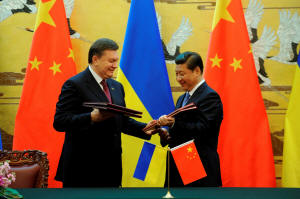Factbox-China's business and economic interests in Ukraine
 Send a link to a friend
Send a link to a friend
 [February 23, 2022] BEIJING
(Reuters) - Ukraine, which is locked in a security crisis with Russia,
has seen growing investment from China in recent years. [February 23, 2022] BEIJING
(Reuters) - Ukraine, which is locked in a security crisis with Russia,
has seen growing investment from China in recent years.
China has a strategic interest in Ukraine because of its location, a
free trade deal between Ukraine and the European Union, and the former
Soviet republic's supply of mineral and agricultural resources.
China has expressed concern about the "worsening" situation in Ukraine
and called for all parties to show restraint and resolve differences
through dialogue.
Below are some of China's main business and economic interests in
Ukraine.
TRADE TIES
Trade relations between China and Ukraine have grown significantly since
a state visit to China in 2013 by then President Viktor Yanukovych.
China leapfrogged Russia to become Ukraine's biggest single trading
partner in 2019, with overall trade totalling $18.98 billion last year,
a nearly 80% jump from 2013, according to data from the State Statistics
Service of Ukraine.
Ukrainian exports to China, mainly commodities such as iron ore, corn
and sunflower oil, stood at $8.0 billion in 2021, while imports from
China, largely machinery and consumer goods, totalled $10.97 billion,
the data showed.
China became the largest importer of Ukrainian barley in the 2020-21
marketing year. About 30% of China's corn imports last year, more than 8
million tonnes, came from Ukraine, Chinese customs data showed.

Increased bilateral trade also facilitated the launch of direct rail
freight service between the two countries, although the frequency
remains low. Ukraine is also a stop on the China-Europe Railway Express
service, which has helped ease logistics headaches for Chinese firms
during COVID-19 pandemic.
BELT AND ROAD
Ukraine is an important hub within the Belt and Road Initiative, Chinese
President Xi Jinping's signature infrastructure and foreign policy
project, which Kyiv joined in 2017. In 2020, the two sides signed an
agreement to strengthen cooperation in areas including the financing and
construction of infrastructure projects.
[to top of second column] |

Ukraine's then presesident, Viktor Yanukovich (L), and Chinese
President Xi Jinping exchange documents during a signing ceremony at
the Great Hall of the People in Beijing December 5, 2013.
REUTERS/Wang Zhao/Pool/File Photo

Big Chinese companies with operations in Ukraine include state food conglomerate
COFCO Corp, state-run builders China Pacific Construction Group and China Harbor
Engineering Co (CHEC), and telecoms gear giant Huawei Technologies.
Direct investment by Chinese firms in Ukraine totalled $150 million by end-2019,
according to Chinese data. In the first three quarters of 2020, Chinese firms
invested $75.7 million on projects in Ukraine, according to Ukraine's embassy in
China.
COFCO in 2016 launched a grain terminal at Nikolaev sea port worth of $75
million in southern Ukraine. In 2019, CHEC completed a dredging project at the
port of Chornomorsk.
China Pacific Construction Group in 2017 signed a deal to build a metro line in
the capital Kyiv and Huawei, which has helped Ukraine to develop its mobile
networks, in 2019 won the bid to install the 4G network in Kyiv's subway.
Huawei was chosen in 2020 to help ensure and improve cyber defence and
cybersecurity in Ukraine.
In 2021, China Longyuan Power Group Corporation , the country's largest wind
power producer, built and put into operation a large wind farm in the city of
Yuzhne.
Not every investment has gone smoothly.
Ukraine said last year that it would halt the takeover of a local aircraft
engine maker by Chinese aerospace company Skyrizon due to U.S. concerns of
forced technology transfers to the Chinese state.
Power Construction Corp of China also signed a deal to construct an 800 MW wind
power plant worth $1 billion with local partners in Donetsk which would be
Europe's biggest onshore wind park.
(Reporting by Stella Qiu, Hallie Gu and Tony Munroe, Editing by Timothy
Heritage)
[© 2022 Thomson Reuters. All rights
reserved.]
This material may not be published,
broadcast, rewritten or redistributed.
Thompson Reuters is solely responsible for this content. |